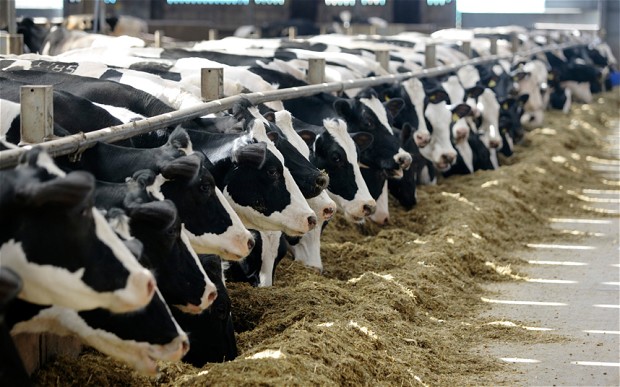Resisting the family soldiering career, Sanjay Choudhary opted a diary unit. In four years, he has doubled his herd, pushed his production to nearly 15 ton a month as locals beeline his cowshed to get pure milk at nearly double the cost, reports R S Gull

Getting into the Lane 2 of Greater Kailash and the dead end has a surprise. It is small crowd of people with cans and pots as if they are on a protest. But the fact is that they are waiting for their turn to get milk – fresh milk from lactating jersey cows that Sanjay Choudhary rare in his concrete urban diary. They come every morning and later in the evening to collect their supplies and there are many more who seek the supplies at their door-step, at a slightly more cost.
Son of a retired BSF Inspector, Choudhary did his matriculation through CBSC and later had his BCA through IGNOU. His father Romesh would tell him to get into the soldiering that off late has been the family’s main bread and butter. He had already managed to his son getting a cop’s job and was not unhappy. “But I never knew why he was reluctant,” Romesh, recuperating from a fracture, said in his well-maintained marble-lobby. “I had told him that I would fetch him a job in police, at least that much I could do in the organization that I served whole of my life. But he was unwilling.”
“I wanted to do something I could manage and control,” said Sanjay. And his first priority was his small number of cows that would usually manage their family needs and save a bit for the market. “I wanted to learn and earn at home.”
Even though he was one of the seniors in responding to the J&K EDI’s call for potential entrepreneurs, he stayed at home for almost a year after finishing his training. He was in a sort of fix whether to do or not. The self-dilemma consumed a whole year but helped him reach the resolve that he can. And then he applied formally.
Once he got into the mill of becoming a self employed, it led him pass through a maze of mess despite having a helping hand in EDI available round the clock, literally. The first was the land. The family was living in a seven marla (1904 sq feet) plot with part of it in disuse. They purchased 15 marls more.
As his case went to the bank, it entailed the requirement of mortgaging part of the land – something that family was unwilling. Eventually, they reduced the scale of project. Initially, it was Rs 8.50 lakh project and once the mortgaging part was done away with, it got reduced to only Rs 5.30 lakh including the 35 per cent of the seed capital money that the EDI deposited in his account.
The second most trying situation that Sanjay faced was in selection and purchase of the cows. It consumed a lot of time for him to identify the right breed. After lot of efforts he identified six animals from Ranbir Singh Pora (R S Pora): two each of Holstein, and Jersey and two more cross cows from the two. “For me, it was the right mix,” Sanjay says. “We already owned four and it was a sizeable flock of ten and I started commercial diary in December 2011.”
Since then, it has not been looking back. “I started initially with 100 liters a day and now it is well above 250 liters,” Sanjay said. “I started with Rs 25 a liter and now I fell short of supplies even after selling Rs 40 a liter.” Then he was alone, now he is supported by two helpers whom he pays. Even some female family members also help him manage the herd. “Now I have 22 animals and a few more will get lactating soon,” Sanjay said.
During the last few years, Sanjay has replaced most of his cows. He applies conventional wisdom: get the older replaced well before aging impacts her produce. But he won’t sell the calves because they are the breed he knows. He is working in a direction to see his herd completely comprising of superior improved breed.
Sanjay’s decision to make superiority of breed is forced by the environment he operates from. His diary unit is located in an urban concrete jungle, literally devoid of the vegetation. His flock is sedentary for a long time because he works against the nature of the cows for obvious lack of pastures. He purchases feed from Punjab for most of the winters and in summers he acquires the same locally. Only during summers does he afford to help cows make some movements in the small piece of empty land that is not covered by concrete. Sanjay says the feed-abundant summers become increasingly messy for the animals because of temperature. “I think these cows can ideally be more productive in Kashmir climate than Jammu,” he asserted. “I have better and constant production in winter than summer.”
“It is better to have one cow that produces 40 liters a day than having two cows with a daily yield of 20 liters,” Sanjay said. “Because I have less space and it helps me cut down costs.” His valuation is that a cow requires a daily in-put of Rs 200. Two of his cows are “best” because they fetch him 35 liters a day, each.
Marketing his produce has been one of his best practices. At a time when the milk sells at sub-Rs-30 a liter in the market, Sanjay markets Rs 40, in certain cases slightly more. “It is purity of milk that people are so desperate about,” Sanjay said. “I told my potential clients, come, watch me milk and take it and then boil at home.” It clicked.
Sanjay lacks any possibility of expansions because land resource is the main constraint. Even his bank wants him to expand by adding some milk-related ancillary. The only thing he has done recently is that he has added a vermi compost unit that processes the 100 kilograms of cow-dung that herd produces a day. “I might have done it earlier but I lacked any knowledge,” Sanjay said. “I started selling the organic fertilizer for Rs 7 a kilogram though Kashmiri apple growers purchase it at Rs 10 a kilogram.”
While Sanjay has graduated as an entrepreneur, he has turned an adviser and the subject specialist for his peers. Now anybody in EDI’s Jammu region operation who has to do something with diary has to have a series of sittings with Sanjay. He is not just a role model, he is a leader now. It is he who helps new entrants to find the animals for their unit because in the entire process it is this part that is tricky and tedious.
But Sanjay’s success has made him understand the problems better. He flagged a lot of issues that could help others in this area manage their initiatives better.
Firstly, J&K lacks high-yielding breeds. Even the straw that the state run animal husbandry department is offering is not what it is labeled!
Secondly, the address for the high yielding cow breed is Haryana. They have breeds that produce as huge as 65 liters a day. But purchasing such cows is beyond the capacity of the entrepreneurs like Sanjay. “Our policy makers have limited the ticket size of the project to a level that you can not purchase cows beyond Rs 40,000,” Sanjay said. “The best of the high yielding cows sell not less than Rs 100,000.”
“The animals are delicate and require huge recurring costs,” Sanjay said. “Helping reduce the numbers of animals in proportion to high yield will make these diary units more profitable and lucrative.”
Thirdly, the health cover is a mess. “On an average, I spend Rs 10,000 per month on the medicines and the consultations,” Sanjay said. Adds his father, albeit in whispers: “But those who offer medical care to our animals are not doctors, they are aides of the doctors!”
Fourthly, the rate of milk must be respectable. Sanjay said major milk processing units procure milk from producer at less than Rs 20 a liter. “If I opt for that, I will become unviable tomorrow,” Sanjay said. “If you sell a packaged liter of water for Rs 18, what milk should ideally get?”
Finally, the state lacks proper insurance cover to the diary units. Last year, one of his animals fell ill and died. “I had told my bank that they should insure my cattle at a rate not less than Rs 40,000 per head,” Sanjay said. “I submitted certificates and everything, but they had not insured the cow beyond Rs 25,000. This, they said, was the extreme limit!”
Living not far away from the highway that connects J&K with rest of India and Jammu with Srinagar, Sanjay said he is personally aware of the milk that drives into Srinagar from Punjab. But the quantum of this import can not be reduced unless there are adequate interventions so that the exercise suits the local entrepreneur. “Do it and see things changing,” a shy Sanjay asserts.
His immediate goal: purchasing a cow that has a daily yield of 50 liters.















